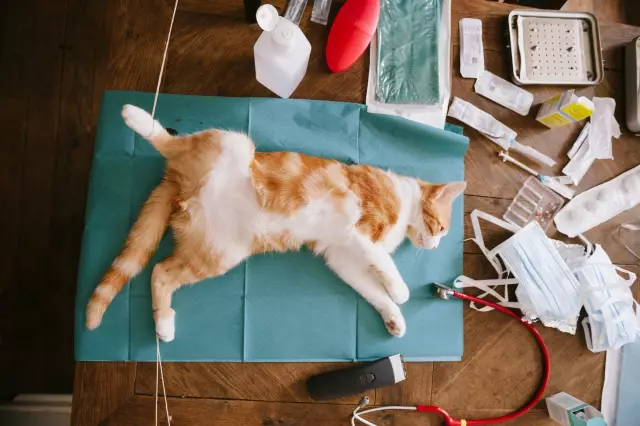- Author Delia Mathews [email protected].
- Public 2023-12-16 00:05.
- Last modified 2025-01-22 15:45.
Planning to have a pet cat? Then you should consider the possibility of castrating him. Otherwise, it will inevitably and quickly begin to bother you and spoil your home environment. Start with what kind of cat you have - pedigree or not. If it is a mongrel animal, then its castration is quite appropriate. But if this is a representative of any valuable breed, then in the future you may want to get kittens from him or just make a little money on his mating. In this case, castration, of course, is not worth it.

What is castration for a cat? This is a planned operation, for which the optimal age of the animal is from eight to nine months. The essence of this operation is to stop the work of the testes of the cat. Why is this the optimal age? The fact is that at this time your pet will already be a practically developed male, but he still does not know anything about the struggle for territory, or about mating.
Castration has a number of positive aspects:
- Your pet will stop behaving aggressively.
- Your animal's behavior will not change with age - it will be as playful and obedient as in childhood.
- The cat's lifespan will increase significantly.
- Your cat will be protected from many diseases affecting the genitourinary system.
- The cat will completely disappear sexual desire and associated unpleasant moments for you (unpleasant smell, damage to furniture, aggressiveness, tendency to vagrancy).
Unfortunately, such an operation, like any other medical procedure, has negative consequences:
- Abscess and infection - this can happen with the inexperience or low qualifications of a veterinarian.
- The onset of severe cardiovascular diseases - this happens most often with old animals, or with such a predisposition.
- Complications caused by anesthesia (a dangerous decrease in body temperature, a slowdown in hepatic metabolism, interruptions in the work of the heart and blood vessels) - with individual intolerance to the drugs used for anesthesia.
- Urolithiasis - usually develops when the operation is performed too early (the kitten still has a defective genitourinary system), or with physical inactivity and insufficient intake of water and healthy food.
- Obesity - occurs with excess nutrition (for castrated cats, the diet is 10-20% lower than for those who have not undergone such an operation) and physical inactivity.
If, after considering all the pros and cons of castration of your future pet, you decide to carry it out, then you need to know about the main methods of castration:
- Drug suppression of the testes with the help of pharmaceuticals - by injection or in the form of a pill, your cat is injected with a special drug, but its effect is temporary (no more than a couple of months).
- Sterilization is not entirely complete castration, since the animal retains sexual desire (with all the attendant consequences), but becomes unable to have offspring.
- Surgical removal of testes is the classic and most reliable operation.
- Chemical suppression of the normal functioning of the testes by irradiating them is considered a safe operation, but still everyone is well aware of the possible consequences of receiving large doses of radiation.






